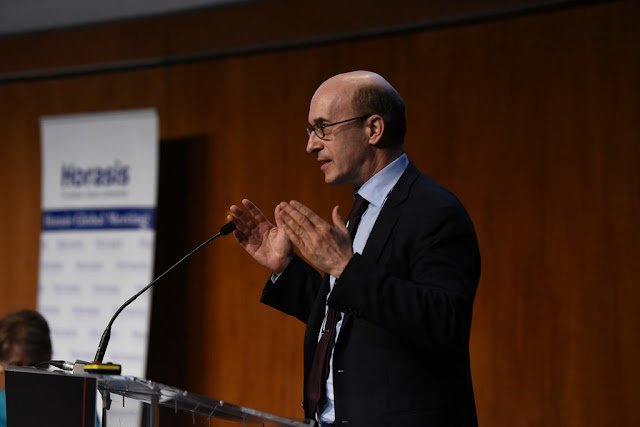Kenneth Rogoff’s war on cash: is he right to call cash a “curse”?
Economist Kenneth Rogoff published in 2016 a book, named “The curse of cash”, pointing at the numerous societal woes he attributes to hard currency, and praising its disappearance in favor of digital money. Despite an obvious desire to adopt a balanced and reasonable stance, several of the points made within the pamphlet reveal links to the partisan war on cash and misrepresent the role of cash in our societies.
In Rogoff’s defense, several good points are made in his new book, “The curse of cash”. The Yale economist assesses, for instance, the Indian cash ban as brutal in its implementation and disastrous in its effects, a point of view shared by just about every observer in the world, save prime minister Narendra Modi, who made the decision. But, all in all, Kenneth Rogoff doesn’t beat around the bush in revealing his opinion: cash is evil and should be replaced. In his introduction, he writes “Cash is becoming increasingly marginalized in the legal economy, but there is a record amount of it in circulation—$1.4 trillion in U.S. dollars alone, or $4,200 for every American, mostly in $100 bills—and most of it is used to finance tax evasion, corruption, terrorism, the drug trade, human trafficking, and the rest of a massive global underground economy.” Also, he concedes that a total destruction of cash currency would have massive and irreversible consequences on the individual freedoms and civil rights, giving unlimited monitoring power to governments who wish to track their citizens. Here again, a vast majority of observers around the world agree with him, as a simple Google search on cashless societies will result in hundreds of bells, alarms and flags warning of the dystopian and Orwellian society which would arise.
Considering that the war on cash has a better chance of succeeding by being waged discreetly, Rogoff advocates for a stealthy, divisional approach; a strategy shared with most of the anti-cash lobby: mainly banks and governments. Investigative reporter Brett Scott writes for the Guardian: “we see an alignment between government and financial institutions. The Treasury recently held a public consultation on cash and digital payments in the new economy. It presented itself as attempting to strike a balance, noting that cash was still important. But years of subtle lobbying by the financial industry have clearly paid off. The call for evidence repeatedly notes the negative elements of cash – associating it with crime and tax evasion – but barely mentions the negative implications of digital payments.” Banks are generally favorable to Rogoff’s views, because cash represents the least convenient form of money for them, and also because cash can leave the banking circuit through withdrawals. If societies were to become cashless, the entire economy would be trapped within the banking world. Banks, like any other business, wish to keep the money close, hence their support of Rogoff. Governments, also, support these views, for two main purposes. The first is to tighten their grip on their own economies. When macro-economic decisions are made, central banks and survey institutes can accurately measure results through banking movements – whereas the cash portion of the economy is much harder to track and assess. Also, governments tend to hate cash because they consider it a preferred means for criminals, traffickers and, of course, tax evaders – although ample evidence shows that the crime world has long moved on from the “dollar suitcase era” and invaded the digital world.
Indeed, financial analyst Stephen Platt writes: “Unlike suitcases full of cash, credit and charge cards are mobile. They cross borders without arousing suspicion. They can be utilised anywhere in the world not only in financial institutions but in retail outlets, hotels, restaurants, travel agents, and money service businesses. In short, armed with a credit card you can pretty well go wherever you want and provided the credit limit is high enough, do whatever you please”, revealing that cash was abandoned in large part by the mob when mobile and digital solutions offered a far safer alternative. While one might imagine indeed that criminals would make substantially larger incomes than regular citizens, it is hard to take the volumes involved by Rogoff at face value and admit that dollars are now owned by criminals instead of honest citizens. According to his assessments, and that of the US government, virtually every single dollar in circulation in the United States would be in criminal coffers and used to finance criminal transactions. It is far more realistic to consider that each bill is used for a hundred legitimate reasons between each unlawful payment. Gainsayers of Mr Rogoff consider cash, not a curse, but the most valuable form of money: flexible, environmentally friendly, safe, symbolic of national unity, socially inclusive, technologically immune and, most of all, private – that last quality gets double points from the civil liberties watch dogs who have been blowing whistles for years.
The thoroughness of the work provided by Kenneth Rogoff can hardly be called into question. As a Yale graduate, and one of the few economists to focus on the war on cash, his data-crunching and analysis is respected, and respectable. However, a clearly biased, anti-cash, pro-bank and pro-government drift can be sensed in the “curse of cash”, if only in the title. The figures used, namely, to size the underground economy, come from… the IRS. Until now, banks and governments have been slowly putting the squeeze on cash while assuring that they are not. Ken Rogoff lending the movement his voice marks a new turn in the war on cash.



